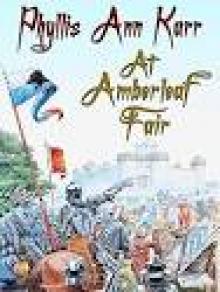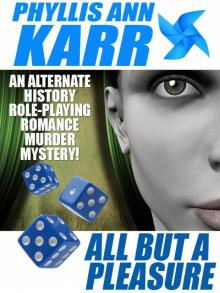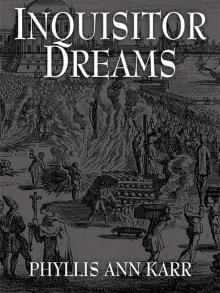- Home
- Phyllis Ann Karr
The Fanciers & Realizers MEGAPACK Page 8
The Fanciers & Realizers MEGAPACK Read online
Page 8
As we settled down again, she said, “You know, Tommi, the option’s still open. You don’t have to go back there this afternoon. If you’d rather not, just say so.”
“No, Sergeant, I want to go.” That is, in a way I didn’t; but in another way I did. After a pause to figure out how to put it, I told her, “I’ll have to confess, Sergeant Thursday, at first I thought you were making this into something it wasn’t. But now I’m starting to think that maybe it was. Maybe Rob was murdered. And if he was, then I certainly want to do my part in bringing his murderer to justice.”
“God woman!” After a pause, she added, “Well, we both have follow-up appointments at Sunvale this afternoon, me at sixteen thirty and you at ...?”
“Eighteen hundred,” I reminded her.
“Works out very nicely. All right, Officer Tomlinson, what I’d like you to do to fill in the time is see what else you can dig up on Arlington Johnson Coffield.”
“I think we got about as much on him yesterday as we’re going to get out of the public databases, Sergeant.”
“Not necessarily. Remember, smart people often choose aliases as close as possible to their old names. You could try running a check on ‘Arlington’ and ‘Coffield’ as family names, try alternate spellings for all three of his present names ...”
“And still come up with less for a full day’s work,” I remarked, a little bitterly I’m afraid, “than you could get out of Jeb P. Peters in half an hour, with the right leading question.”
‘Maybe, but ...” After a longer pause, Cagey resumed, “Tommi, I’m going to give it to you straight. As I read it, our most immediate needs are for more data on Coffield and on ... I hate to say this ... Rob Grove. I thought I’d take Rob myself, but if ...”
“You’re right, Sergeant,” I decided. “I’ll see where else I can go with the pharmacist.”
* * * *
Half-heartedly trying every possible first-family-and final name recombination of Arlington Johnson Coffield, with all the Directory spelling variations the program could think of for Johnson, and such free-association names as Parks and Coffin, I still hadn’t gotten anywhere by lunchtime. Over our sandwiches, Cagey suggested “Caulfield” as a possible alternate version of Coffield. Feeding that in after lunch, I eventually came up with Jan Caulfield Jansen.
Jan Caulfield Jansen’s fingerprints looked to my semi-trained eyes as if they could be Arlington Johnson Coffield’s without the scars. Even nowadays, with the Metterkranz System and its allowances for scars, a computer might feedback several alternate pre-accident sets for fingerprints as badly pocked as Arlington Johnson Coffield’s; and I had never really had any formal training in print identification. Still, the match looked possible enough to justify running a check on Jan Caulfield Jansen.
Born October 18, 2000, in East Chicago, Indiana, he had been raised and gotten his gradeschool education in northwest Indiana, graduated from Lois Soderstrum High School in Joliet, Illinois, and gone on to earn a Phar.M. at Chicago. From there, after working at five different drugstores and hospital pharmacies in places I guessed to be small towns or suburbias in that same general area of the country, in March 2026 he had opened up his own pharmacy, the Nostrum Shop, in Evanston, Illinois.
The Nostrum Shop had lasted less than a year, going out of business in January 2027. Caulfield’s home bills—heating, utilities, TV, and so on—had continued to be paid for the next five months, until on July 1 he had canceled home mail delivery and paid a year’s rental on a post office box. His residential address bills had stopped being paid for seven months and then taken over by somebody named Zytkoskes. After June 30, 2028, when his P.O. box rent expired, Jan Caulfield Jansen seemed to disappear from any updates anywhere.
It all looked like a common reverse-success story of the 2020s; and if Jan Caulfield Jansen really was Arlington Johnson Coffield, who had somehow earned and saved enough under yet a third name, during the lost years between 2028 and 2030, to earn a Phar.D. from Columbia and start a prosperous new life for himself here in Marltown, Kentucky; then some part of me couldn’t help but wish him well and turn back to Dr. Raisa Rachmaninova Suttler for our primary suspect. Especially as part of Caulfield-Coffield’s story looked based in tragic fact: the rest of his immediate family—mother, father, and two sisters—had moved to the west coast in 2022, when he was in college. One sister had reregistered her home address to Boise, Idaho, in 2025, so I supposed that she might still be alive, unless she had been visiting her parents for Christmas, 2029.
The first official workday after December 25 of that same year we were investigating Sunvale Clinic—2036, seven years after the Quake—would see a lot of “Presumed Dead” tags go from flashing to steady in the Name and Print Directory.
I remember being tempted to stop there, full of sympathetic heartache for Arlington Johnson Coffield; but the clock digits were only touching 15:00, and Cagey had said we’d “coffee break” (meaning, for her, time to finish a mug without the distraction of work) at our usual time, 15:15. So I ran a check of Caulfield’s name through the newstory index, and found one reference to a story in the Chicago Tribune, which was still (or again) being issued in a pulp-paper edition during the ’20s, side by side with its screen edition.
Most dual-medium newspapers used to put out a screen edition first, then the pulp one. As is still the practice, the screen edition was continually updated until whatever hour it was marked “Final” and stored in the datamorgue for that date. The Chicago Tribune made a selling point during the 2020s of putting its pulp edition out before the earliest screen edition of that day, which may have been what made it the last major newspaper on the continent to go on publishing a daily edition on pulp paper.
The name “Caulfield, Jan ... Jansen” appeared only in the index to the pulp edition, in a news item for September 2027. It turned out to be a short article, section A, page 29:
* * * *
DRUGGIST WANTED FOR QUESTIONING
Acting on the advice of an anonymous tip, Evanston police are on the lookout for Jan Caulfield Jansen, 27, former owner of the Nostrum Shop, an Evanston pharmacy.
Caulfield is wanted for questioning in connection with the alleged outbreak of botulism, Jan. 4 of this year, at the Sicilian Vespers restaurant, Evanston, in which three people almost died.
* * * *
The whole story was gone from the screen edition of that day’s Tribune, its space refilled with a small ad for the Epicures’ Palace restaurant, Evanston, S. Scarpio Scarpini, owner and manager. The substitution seemed rather ironic; but I guessed that between the pulp edition and the Final, file screen edition the police had found Caulfield. The paper must have had time to kill the first article but not to write a follow-up, so inserted the ad instead.
But what had happened to Caulfield after that? The police files might tell me, but police files were officially closed to the public. Had he gone to prison? Hardly, or the newstory index would surely have listed at least one later item about him. Had he skipped town ahead of the police?
If, in spite of the lack of a new item about it, he had gone to prison, it must have been for a short term, to give him time to scar his fingerpads and have them healed enough to fool the Names and Prints registrar in December 2029. A prison record wouldn’t necessarily show up in Caulfield’s public registry data; the guidelines about privileged privacy of such information were pretty lenient in the 2020s and ’30s, especially in cases of minor offenses or exemplary prison records. But if he had scarred his fingerpads in prison, they would surely have retaken and reregistered on his release, and shown up scarred in the Names and Prints entry for Jan Caulfield Jansen.
It was beginning to appear, though, that he might have had serious reason for altering his fingerprints. Enough reason to justify the pain—it must have been a painful process. Always assuming that Caulfield and Coffield were the same man, and that he had done it all on purpose.
By now I felt so sure they were, that my sympathy for the pharmacist began slipping away, and I made printouts of both newspaper pages and added them to my thin folder on Caulfield.
Cagey was hard at work with the computer in her office.
“Well, Sergeant,” I said as I came in, “What have you found?”
“Nothing,” she replied. But she had given a start at my first words, and then erased her screen much faster than usual. “How about you, Officer Tomlinson? Did you find anything?”
“Oh, a little something. A possibility, anyway.” Giving my folder a pat as I set it down on her desk, I added, “Come on, Sarge. You were researching Rob, I know that. You can tell me what you found. I told you, I can take it.”
“Yes ... But the trouble is, I didn’t find anything.” Keeping her face down, she opened my Caulfield folder and glanced through the printouts. “Yes, yes, looks as if you’ve handed me a real platinum mine here. Well, come on, Officer!” She stood up briskly. “Let’s take our break at the Torte House today. If we hurry, we’ll have a good half hour there, and I can still make it to Sunvale in plenty of time for my appointment with Suttler. And you’ll have time to shop for that new dress uniform you’ve been needing before you stroll on over for your date with Doc Mac.”
Chapter 7
By “dress uniform,” Cagey meant something nice to wear on formal occasions; and saying that I had been “needing” a new one was her way, I guessed, of giving me a few hours off to cheer me up a little. To make sure I shopped, she “requisitioned” me fifty tridols: more than generous, at 2030s prices, for the new “uniform.”
The best of the ’30s fashions are still lovely today, but the most extreme could be even wilder than what people wore during the ’20s. The winter of ’35-’36 was about the time elbowtail sleeves and sweep collars were at their most popular, and I was in a rather strange mood that afternoon. I squandered forty of my employer’s tridols on an overpriced outfit that even I was never able to look at again, much less wear outside the fitting room; eventually we donated it to a local live-theater group.
Having arranged for this humongous monstrosity to be delivered to Warrington House for me, I crossed town on the new underground speedicar and reached Sunvale Clinic about 17:50. The only other person in the waiting room was, to my surprise, Miss Woodburn, sitting up ruler straight in front of the aquarium.
“Miss Woodburn, isn’t it?” I asked politely, joining her.
“Ah, Miss ... But you seem to have the advantage of me, ma’am?” She made it a question.
“Tomlinson,” I replied. “We met yesterday. And I prefer to the emmed.”
“I fear I never simply ‘M.’ anybody, Miss Tomlinson. It is a vulgar, newfangled, leveling practice. Persons are either ‘Mister,’ ‘Master,’ ‘Mistress,’ or ‘Miss.” I shall, however, address you as ‘Missus,’ if you prefer.”
I said that “Mistress” would be fine.
“Yesterday ...” she went on. “Ah, yes, I remember now. You had just said that it was your first visit here, when I was called in. Well, well, Mistress Tomlinson, one’s first visit commonly entails the second falling within the same week, but what a whimsical hypochondriac you must think me, to be sure!”
“Not at all,” I replied, wondering whether Cagey had left the clinic or was still in
Dr. Suttler’s office.
“But let me assure you, ma’am, it is nothing of the sort with me. I have simply stepped in here, after a day’s shopping, to watch these fishes for half an hour, for they are vastly amusing, and the best specimens of their kind to be found in this neighborhood.”
I voiced agreement and settled down to watch Elvis and Norbert and the rest of them, secretly wishing I could ask Miss Woodburn if she had seen Cagey, without blowing our cover. Would it be possible to ask if she knew anything about yesterday afternoon’s emergency case? No, because Miss Woodburn had already gone back to see the pharmacist before Cagey was brought in.
As I was working this problem over in my thoughts, to a background chatter of small talk about the fish, I happened to glance over my shoulder and suddenly felt stiff. The tall, grimfaced woman I had seen briefly at Rob’s funeral now stood at the reception desk, clothed in a medical tunic of pale green and wearing a stethoscope around her neck, talking to M. Kareem.
Turning my head quickly to avoid being recognized, I asked Miss Woodburn in a confidential voice, “Who is that talking to the receptionist?”
Miss Woodburn needed only the briefest glance. “It is the Rooshan female, of course. Dr. Suttler. I marvel you have not yet met her, Mistress Tomlinson.”
“I have ... That is, I’ve seen her once, but not to hear her name. That’s why it surprised me to—”
“M. Tomlinson?” said a voice which could only be Dr. Suttler’s, even though the Russian accent sounded even lighter to me than it had in Cagey’s recording. “You may as well go back now to Dr. Macumber. He is ready to see you early today.”
How had she known my name? Of course: the receptionist. The entire clinic must know it be now. Bracing myself, I got up and headed for the consulting and examination rooms, telling myself that I had nothing to be afraid of or even bashful about. It was hardly my fault, after all, if I had broken up Dr. Suttler’s affair with Rob, seeing I had never known anything about it until just this morning; and I had had every bit as much right to be at his funeral as she’d had.
For all that, I still couldn’t help keeping my head slightly down and averted. I could barely glimpse her expression as I passed; but it looked like the kind of little frown people get when they think they recognize someone or something, but can’t quite remember from where.
Had it been Dr. Suttler who arranged for Rob’s funeral? “Dear Friend ...” Had she not quite wanted to risk the word “Beloved” across the flowers she sent? Or had hers been that one tiny, saucy flower basket with no banner, and had she relented after sending it as a sort of final insult, and attended his funeral after all?
Most important, what had she felt there? Triumph? Remorse? Just simple loss? What?
It was a relief to get to Dr. Macumber’s office, a wonderful comfort to find him already in it, perched on the edge of his desk. He held a black steelplas box open on one upper leg, and sat there thumbing through the computer chips it held. Thinking of what would probably happen to Cagey if she tried doing such a thing, I giggled. In the recording it sounds like a nervous giggle, a release of something almost bordering on hysteria.
“M. Tomlinson! Anything the matter here?” Looking up, he slipped the box smoothly to his desk mat, stood, and caught me with a steadying hand under my right elbow. “Here, now, you’re just a tad pale around the gills. No side effects from that caplet I gave you yesterday?”
“Oh, no! No, I don’t think so, nothing like that.” But what could I tell him? “No, I just witnessed a…a near accident on my way here. A couple of cars almost collided.”
“Ah! Yes, that can shake anybody up a bit. Especially the drivers, eh? Let’s hope. Teach ’em to watch their toes and wheels a little better in the future. Well, M. Tomlinson—mind if I call you Sylvia?”
“Fine, Doctor. Please do.”
“Doc Mac, please! Well, then, Sylvia, I’m afraid we can’t very well let you have any tranquility poppers for about half an hour yet—not till after I draw my two milliliters of blood.” He winked. “But sit down and try a little cup of herbal tea. My own special blend, nice and calmative with no reactive effects at all.”
He drew some for me in a porcelain demitasse mug, and it really was excellent,
with a strong but pleasant lemony rose flavor. He gave me a printout of the recipe, which I’m sure is complete; Nancy can follow it and make a blend that tastes identical. We’ve found it doesn’t seem to create a sense of calm, however, unless it’s sipped in the company of a cheerful and calming fellow human being. A few friends report that it
also works in the company of a favorite pet animal. It seemed to calm me right down that afternoon; but Doc Mac’s company might have done the trick even without his herbal tea.
While I sipped, he found the chip he wanted, pulled it from the black box, and put it in his office computer. “Your file,” he explained to me. “Little Peachblossom here—” He petted his computer—”Doesn’t have enough kilobytes in her permanent memory for everything. Isn’t that right, P.B.? Now, then, Sylvia, I started your file yesterday after you left. Let’s see how well my memory served.”
“Didn’t you record it while I was here?” I asked.
He chuckled. “Stopped recording my office calls back in Thirty. Tell you the truth, I never much liked doing it in the first place. Growing up as a teenager during the century’s Teens, I guess, and then managing somehow to lead a quiet life all through the Twenties. Made my ideas pretty oldfashioned about a lot of things.”
I could have told him that I had most of yesterday’s visit on cube and that my recorder was on for today’s as well; but it turned out that his memory was excellent. Standing up to read Peachblossom’s screen over Doc Mac’s shoulder, I found no need for any additions, corrections, or subtractions.
“Now we know each other a little better,” he went on, “now that we’ve established eye contact, so to speak, I’m sure you won’t mind if I save myself a bit of time by taking notes directly while we talk, will you?”
“Of course not, Doc Mac.”
He got me another demitasse of tea and called up a new form for today’s notes. After a few moments of watching him key them in, I sat again and went on talking quite easily, even though I couldn’t find any new symptoms to report; nothing that didn’t seem natural, considering my state of bereavement over Rob and anxiety about Carmine’s.
Groping for things to tell Doc Mac, I took advantage of his question about how I was sleeping, and described all I could remember of my dreams of the night before. He seemed so interested that I wondered if he had a psychohygienic leaning toward holistic dream analysis.

 The Gallows in the Greenwood
The Gallows in the Greenwood At Amberleaf Fair
At Amberleaf Fair Frostflower and Thorn
Frostflower and Thorn The Fanciers & Realizers MEGAPACK
The Fanciers & Realizers MEGAPACK All But a Pleasure
All But a Pleasure The Idylls of the Queen
The Idylls of the Queen Frostflower and Windbourne (Frostflower & Thorn)
Frostflower and Windbourne (Frostflower & Thorn) Inquisitor Dreams
Inquisitor Dreams